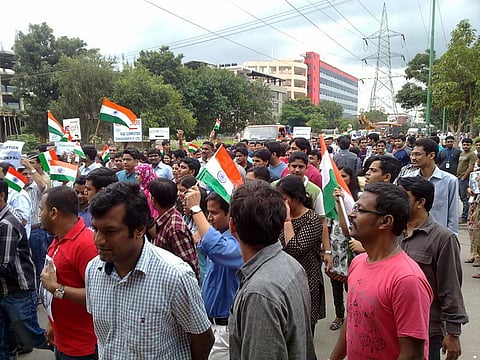

People’s Convention, which converged in Hyderabad on July 22, unanimously rejected the Regional Comprehensive Economic Partnership (RCEP), a proposed mega regional Free Trade Agreement (FTA), which 16 countries, including India, are negotiating. Terming this proposed FTA as anti-farmers and anti-poor, the convention says that it compromises food sovereignty of developing countries. It has demanded immediate halting of negotiations and put all the negotiation-related documents in the purview of public and should be debated in the parliament.
Besides ASEAN countries, their six FTA partners—India, China, Australia, Japan, South Korea and New Zealand— are negotiating to liberalise the rules and laws in trade in goods and services to boost investment in 16 member countries.
On July 23, the ‘People’s Resistance Forum against FTAs and RCEP’, which included hundreds of peasants, agricultural workers, women farmers, fishermen, trade unions, women’s organisations, industrial and mining workers, hawkers and street vendors, sex workers, public services employees, students, engineers, teachers, lawyers, environmental activists, Dalits and tribals, voiced apprehensions about the RCEP.
“RCEP is taking away seeds from farmers,” says Burnad Fatima of Asia Pacific Forum on Women Law and Development (APWLD). “There can be no food sovereignty without seed sovereignty. Women farmers should unite to reject FTAs that take away farmers’ rights and land rights,” she adds.
The organisations under the People’s Convention claim that the RCEP would potentially destroy the nascent e-commerce industries in developing countries. Stringent intellectual property rights proposal will further encourage monopolies in generic drugs, which will reduce availability of affordable medicine.
Rules under the RCEP will also facilitate free access to Indian data by global big business, giving them control over every sector. “The e-commerce chapter in RCEP will allow foreign technology corporations greater access to India data and threaten security of India’s digital industry,” says Parminder Jeet Singh of IT for Change.
With stronger patent rights for big pharma companies, the RCEP will increase the costs of medicine and damage India’s generic drugs manufacturing sector. Public services like health and education will be even more privatised, making it inaccessible for the masses. “The proposals for stringent intellectual property will create monopolies, impact generic production and adversely affect access to affordable medicine,” says Leena Menghaney of at Médecins Sans Frontières (MSF).
Speakers expressed concern that the agreement was being negotiated in complete secrecy at the Hyderabad International Convention Centre. The RCEP chapters have been negotiated behind closed doors. Few texts under negotiation have been ‘leaked’ online and analysed, which are the only source of information. The analysis indicates that the RCEP as the world’s largest FTA that will impact nearly every sector of the economy and is an onslaught on people’s lives, livelihoods and human rights.
“Free trade agreements imply neither freedom nor are based on agreements. Disclosure, transparency and open discussions are required on RCEP whose texts are couched in complicated legalese,” says Yogendra Yadav of Swaraj Abhiyan and All India Kisan Sangharsh Coordination Committee.
At a time when farmers in India are agitating for better crop prices and committing suicide, the RCEP would remove import tariffs, throwing the farmers further into crisis with cheaper imports of crops and milk products. Local manufacturing will take a hit, with workers losing their jobs and wages and getting pushed into unorganised sector.
“The experiences of over the last two decades of corporate globalisation have shown that the already marginalised and most vulnerable sections such as Dalits, adivasis, small farmers, unorganised workers, denotified tribes, minorities and women stand to lose the most,” says People’s Convention in its press release.
The press release termed the RCEP as another face of corporate globalisation.
“It creates more rights for big corporations and grants investors. The powerful tools like the investor-state dispute settlement (ISDS) mechanism obligate the government to protect the safety of investments of foreign companies at the cost of the rights and interests of its citizens. The agreements under the RCEP undermine the sovereignty of our governments to make its own laws and policies as per our needs,” the release states. The People’s Convention has been demanding that India should retain its sovereignty to make laws and policies in the interests of the citizens and its environment which this RCEP is taking away.
It has been demanding consultation with all stakeholders like farmers’ organisations, labour unions and trade unions. It also calls for a debate on the RCEP and other FTAs in the Parliament and hold consultations with state governments and local bodies.